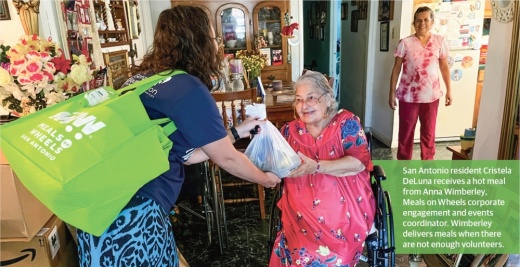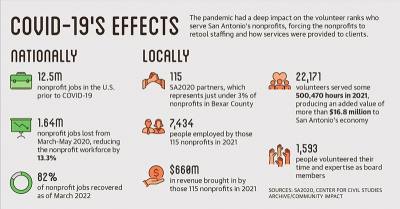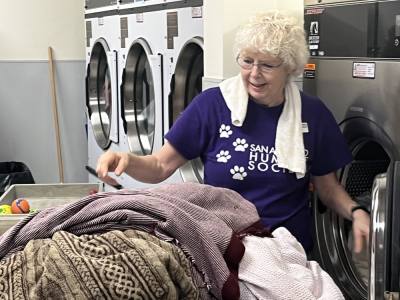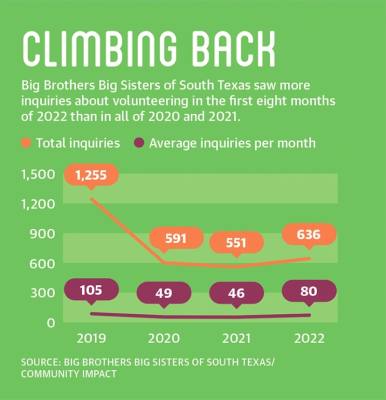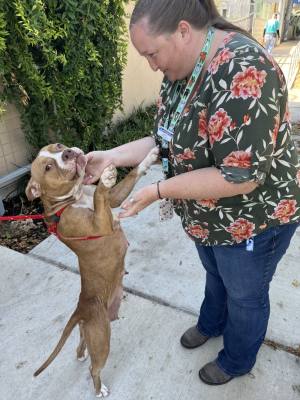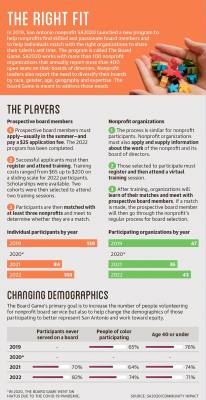“I just feel like I’m accomplishing something, and I love animals, and I know they need the help,” Workman said. “I feel appreciated.”
On her birthday in 2020, that all came to a halt. The COVID-19 pandemic essentially shut down San Antonio, including thousands of nonprofits whose volunteers were all told to stay home.
“When COVID[-19] hit, we shut down temporarily,” said Sarah Rhin, San Antonio Humane Society volunteer supervisor. “It was bare bones staff. We were just figuring it out like everyone else.”
It is difficult to put a number to how many nonprofit organizations and volunteers were affected by the pandemic, because no one agency tracks that data, nor has anyone studied it comprehensively, said Scott McAninch, CEO of The Nonprofit Council, a membership organization that works with nonprofit leaders and runs the annual online fundraising event The Big Give.
McAninch said of the roughly 300 nonprofits surveyed through The Nonprofit Council, 90% reported a drastic decline in volunteer workers. And SA2020, a San Antonio nonprofit that also works with potential volunteer board members through its program The Board Game, reported in its 2021 annual report that 80% of the 115 nonprofits they partnered with reported a drop in volunteers due to the pandemic, which mirrors reports across the region and state.
The pandemic’s punch
In 2020, the San Antonio Area Foundation funded a study that was co-developed with the San Antonio Chamber of Commerce, the Family Service Association, the Nonprofit Council, and United Way of San Antonio and Bexar County.
The 2020 Nonprofit Economic Impact Study showed that COVID-19 was exacerbating the city’s pre-existing needs, which are often split along racial lines. Nonprofits were being called on to increase aid to families while at the same time experiencing significant loss of revenue with canceled fundraising events and drastic changes in their staffing models, according to the report.
Michele Hoskins, executive director of the Masters Leadership Program of Greater San Antonio, said with the increased needs, new nonprofits were formed to serve San Antonio and the surrounding area amid the pandemic. At the same time, Hoskins said, workforces for established nonprofits and civic organizations shrank—both paid and volunteer.
By 2022, there were 10,455 nonprofits in San Antonio, an increase of 5.49% over the previous year, Hoskins said. In 2020, there were 85% fewer volunteer hours given, and over 2021 and 2022 volunteers have slowly returned to nonprofit organizations, Hoskins said.
Hoskins, whose organization provides training for board members who serve with nonprofits and civic organizations, said partner agencies are reporting volunteers are returning. SA2020 is reporting the same.
In SA2020’s 2021 annual report, 80% of the 115 nonprofits they partnered with reported, over fiscal year 2020-21, 22,171 volunteers served upwards of 599,470 hours.
In 2021, the Independent Sector estimated the value of time given by volunteers by calculating the average hourly rate of volunteers at $28.14 per hour in Texas, a 6.5% increase over 2020, the report stated. The volunteers who served SA2020’s nonprofit partners produced an added value of more than $16.8 million that contributed to the city’s economy.
SA2020 President and CEO Kiran Kauer Bains said her organization is working hard to increase volunteerism to affect larger scale change.
The foundation of the organization is a shared community vision, first defined in 2010 under then Mayor Julian Castro, then again in 2020. That overall community vision is meant to drive progress in San Antonio and work toward equity—one decade at a time, she said.
Nonprofits, including the boards that govern them, are a big piece of the puzzle, said Bains and other nonprofit leaders.
“Volunteerism is something we definitely want to track better,” Bains said.
Current climate
Bains said the reduction in volunteers was, in some cases, because it became dangerous if volunteers were in direct contact with others during the onset of COVID-19. In other cases, volunteer roles changed or adapted to meet the needs of clients during the pandemic. Nonprofits had to innovate to survive the crisis, Bains said.
One example, Bains said, is that Meals on Wheels, which provides nutritious meals and companionship for seniors, implemented new technology to help coordinate volunteer drivers. The downside was that some volunteers were unable to use the new technology, Bains said.
Meals on Wheels also shifted its model from a daily hot meal delivery system to a twice-weekly frozen meal delivery system, then to pandemic pickup locations to reduce contact among volunteers, staff members and clients, said Ariana Barbour, director of marketing and communication.
The loss of volunteers also included corporate teams that could offer time in a larger way. Both are returning to nonprofits, but Barbour said it has been slower with corporate partners.
With fewer volunteers, Meals on Wheels staff members are filling in the gaps.
The Gonzaba Foundation for Healthier Communities stepped up in mid-October to offer 50 volunteers to deliver meals for a day to seniors on San Antonio’s South Side.
“We’re doing this to give [Meals on Wheels] respite, to give their volunteers a break,” said Fernanda Cardenas, executive director of The Gonzaba Foundation, a charitable organization supported by Gonzaba Medical Group that works to provide resources to elderly people.
Meals on Wheels delivers 4,000 hot meals a day to seniors who may otherwise have no way to get a hot meal, Cardenas said.
“It was really eye-opening to see, to think, ‘How are these seniors getting their meals if there’s a shortage of volunteers?’” Cardenas said.
Meals on Wheels CEO Vinsen Faris said it is also about more than the meal, and volunteers are critical to the organization’s success.
“I used to be the one guy who’d jump on the table [saying], ‘It’s all about the nutrition, it’s all about the food, it’s all about the meal’—to give them strength,” Faris said, adding he now has a better understanding of what matters most. “It’s really the personal touch. It’s the volunteers who are there with that smiling face saying, ‘Hey, how are you?’ A volunteer fills a huge gap there, a huge need.”
Denise Barkhurst, president and CEO of Big Brothers Big Sisters of South Texas, said the pandemic was particularly challenging for a program built on one-to-one in-person mentorship for local youth.
In other parts of the country, BBBS went virtual, but in South Texas they opted to stay in person to avoid competing for screen time with schools, she said. Plus, Barkhurst said, it is hard to develop relationships virtually.
The number of inquiries to mentor dropped significantly at the beginning of the pandemic, but regular volunteers stuck with the program, and the numbers are climbing again, she said.
BBBS was getting 120 volunteer inquiries a month on average. But beginning in March 2020, the organization shut down completely for eight weeks. In April 2020, the organization only received 15 inquiries.
“That’s plummeting, right?” Barkhurst said. “We weren’t even [deep] in the pandemic yet, but we were waiting and wondering.”
Volunteer inquiries are increasing, she said. This September, BBBS had 123 inquiries. By mid-October, it already had 138 inquiries. Mentorship is a big commitment, she said.
“Kids need us now more than ever,” Barkhurst said. “People are ready to get back out there again. I’m not sure [volunteerism is] ever going to get back to what it was.”
As of Oct. 21, Barkhurst said, 745 kids matched with a big brother or a big sister, but there is a waitlist of 221 kids. The program needs mentors to match with those kids, but volunteers have many demands on their time, she said.
“We’re needing mentors in every quadrant in town, north and south, east and west,” Barkhurst said.
Evolving for the future
To help support nonprofits in their search for volunteers, The United Way of San Antonio and Bexar County operates w•ww.volunteersanantonio.or•g, which enables individuals and groups to find new opportunities to share their skills and time.
From 2021-22, United Way officials have seen “a sizable resurgence” in volunteers, and this year about 1,500 people have already volunteered, said Kevin Femmel, director of communications for United Way of San Antonio and Bexar County.
“The individuals and corporations who volunteer with us are some of the most dedicated people in our community when it comes to caring for others,” Femmel said. “We believe many of them saw the pandemic as a call to action to help others even more than before due to how the pandemic has affected in-person community services.”
Although involvement is returning in some areas, Asia Ciaravino, president and CEO of the Children’s Shelter, which works with foster children, said the concept of volunteerism needs to change.
Nonprofits need to work hard to recruit and retain younger volunteers who want more flexible schedules and different opportunities to serve, Ciaravino said. It is also not easy to volunteer for some organizations, such as the Children’s Shelter, which is highly regulated and requires multiple background checks, she said.
Ciaravino said one of her ideas is to harness the creativity and imagination that comes with San Antonio influencers and social media, and to help them help others make the connection between volunteer service and becoming a donor to financially support a nonprofit’s mission. She calls it “influ-action” or influ-activators.”
“We need them to be influencers on social media ... to bring in people,” Ciaravino said, “Sharing that information, sharing stories—they have no idea how much value comes from just that.”
The benefits of sharing those stories can be long-lasting, Ciaravino said.
“Any human can make a large impact on an organization without ever stepping foot on a campus,” she said, explaining this is a broadening of the definition of volunteerism.
McAninch agreed that nonprofits need to rethink what volunteerism looks like and be creative in recruiting new volunteers, because the pandemic has changed how people live and work.
He said one challenge is people have a lot affecting their well-being right now, including health concerns, politics and even the economy. They are less willing to commit long-term or for a set schedule—a sentiment echoed by both Barkhurst with Big Brothers Big Sisters and Rihn with the SA Humane Society.
“People are willing to commit to a one-off—an event—but not six months of service at a time,” McAninch said.
More people are working from home or are now on hybrid schedules splitting their time between an office and home, he said.
That is one reason it has been hard for nonprofits to get their corporate supporters back, he said.
“I think there’s a mindset that’s really taken over with a lot of people—that I’m really careful with my time,” McAninch said. “I have a better work-life balance now.”




